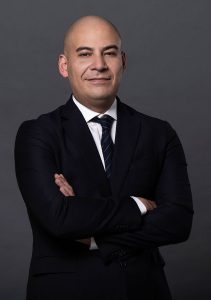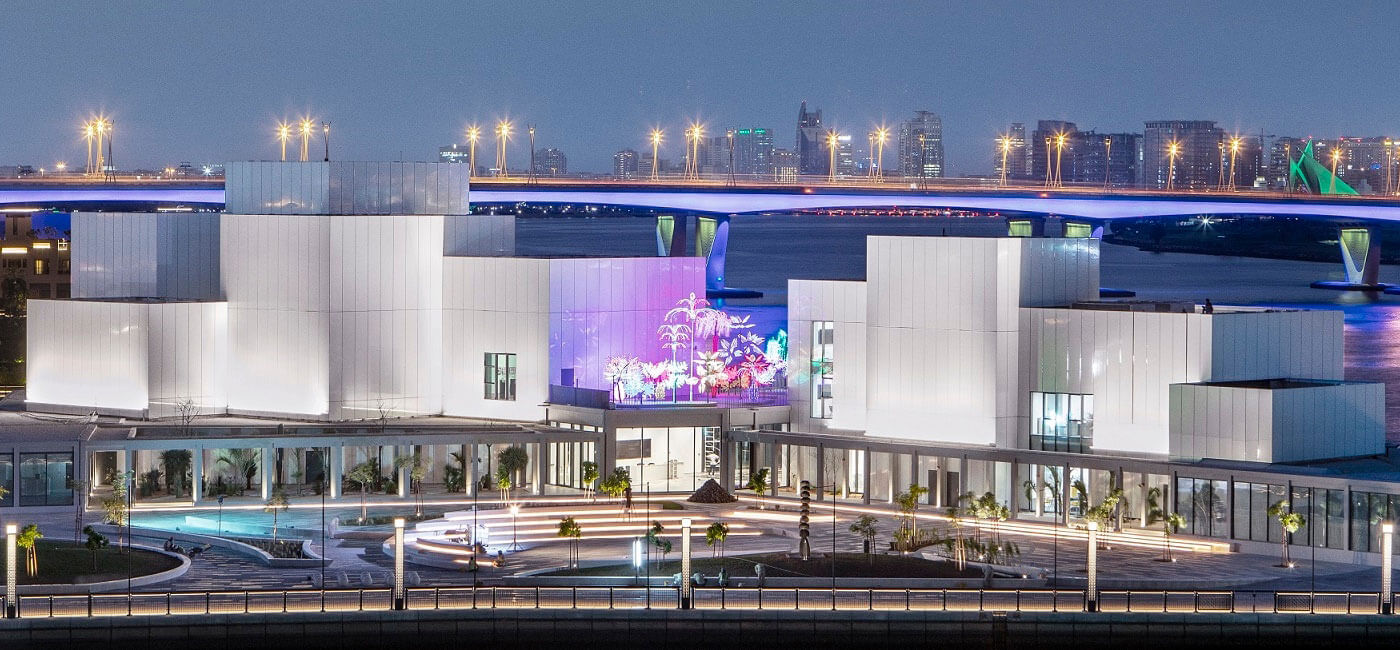Fady Jameel discusses the important influence of arts and culture for future societies
12 January 2020 | Source: Al Sharq Alawsat
The role of art and culture is increasingly recognized as having an impact far beyond creative circles, acknowledged as having a tangible influence on our economy, wellbeing, society and education. Considering art as a form of communication: it is inclusive and nondiscriminatory, able to unify in a progressively divided world. In a recent interview with Asharq Al-Awsat, Fady Jameel, President International, Community Jameel, discussed this topic and how Art Jameel is at the forefront of this movement in the region – and beyond. The interview is shared below, translated from the original Arabic, with kind permission of Asharq Al-Awsat; read it in its original location here.
 What would you say has been Art Jameel’s influence on the region?
What would you say has been Art Jameel’s influence on the region?
My family founded Art Jameel back in 2003, as part of our wider philanthropic endeavour Community Jameel – but for several generations now, we’ve been arts enthusiasts, and aware of the ways in which access to culture and ideas can contribute to the development of society in such transformative ways.
My grandfather, the late Abdul Latif Jameel, helped disadvantaged people in the fields of healthcare and education, and today, Community Jameel is dedicated to supporting social and economic sustainability; Art Jameel takes the same sentiment but applies it to the field of culture. We work on the principle that the arts are for everyone – from school children through to adults of all backgrounds – and that creativity is a pillar of a healthy, discursive, future-proofed society.
What influence have we had on the region? Well, we think first and foremost about impact. We’ve been working in Saudi Arabia, Egypt and elsewhere in the region for many years, in partnership with both governmental and private organisations, running heritage arts schools, plus other grass-roots projects. We have long-term partnerships with the V&A in London and the Met in New York, among other international institutions, making sure artists from the Middle East are represented in the world’s most popular museums. And in 2018 we opened our first major contemporary institution — the Jameel Arts Centre, Dubai. The Jameel, as it is becoming known, is the first contemporary art museum in Dubai, and the response over the past year has been incredible – from the local community, schools and artists, through to the international art world.

At the Jameel Arts Centre, we’ve deliberately tried to create a civic institution that foregrounds education, research, public outreach and programming, alongside high-quality, thematic, investigative exhibitions and commissions that get everyone talking about the pressing issues of our time. We’ve underwritten free entry – so visitors are encouraged to make it their ‘second home’, and come back for multiple visits, to the exhibitions, library, projects spaces and the beautiful Sculpture Park (a collaboration with Dubai Holding). Only the arts can open up such spaces for debate and learning. We’re honoured to be a part of the UAE’s growth as a cultural destination, and to be able to work with and alongside such a dynamic government- and private-sector-led arts scene. The Jameel Arts Centre is one of the first non-governmental institutions of its kind in the Gulf; we hope that its presence and success will encourage other philanthropists to come forward and support such creative endeavours.
And now we’re gearing up for Art Jameel’s largest-scale project yet – Hayy Jameel, a multi-disciplinary cultural complex in our original hometown, Jeddah, set to open next winter. This could not have come at a more timely moment, given the centrality of arts and culture in the new Saudi Arabia, and that this moment of ‘cultural renaissance’ is garnering so much international interest as well as grassroots support.
Art Jameel is known for the diverse range of exhibitions, talks, workshops that it hosts, do you have ambitions to expand on this?
Thank you! Our programmes are exceptionally broad, ranging from traditional artisanship and the preservation of crafts and architecture through to the most cutting edge of contemporary arts. Hayy Jameel includes not only art but also cinema, comedy, performance, entrepreneurship, architecture and design. But at Art Jameel’s heart is the mandate that culture is an essential pillar of society, and that the arts enable the broadest, most dynamic and future-oriented of learning opportunities – in short, that the arts matter. This sentiment unifies our programmes. The Art Jameel team always has its ear to the ground, and we aim to keep as flexible as possible, so we can respond to the needs of the communities we serve.
Do you receive feedback on your initiatives and events from the community?
Yes, listening to the community is an essential part of staying relevant, and we absolutely value all feedback. Of course, these days, everyone can have their say on social media, and the Gulf is no exception – in fact, notably in Saudi Arabia, people are particularly articulate, digitally, and not shy to give opinions. We also survey our audiences after major events and learn from their feedback. Our ethos has always been that our centres are “for – and by – the community”, and this sense of communal ownership is very important to us, and to the success of our programmes. Thankfully, we’ve been overwhelmed so far by the positivity of the feedback, but I always encourage the Art Jameel team to stay on its toes!

How much influence has Art Jameel had on the teaching of traditional arts in Jeddah and Cairo? And, is that reflected in the numbers of students and graduates, and their influence on the arts scene?
We believe that – in cities like Jeddah and Cairo — the traditional arts are contemporary – they are part of everyday life, part of our past and our future. We’ve witnessed in recent years a huge upswing of interest in preserving our history and architecture – perhaps as we move ever-faster towards the future, we have an increased awareness of how important it is to have a solid and visible past. The number of applications to both schools has increased each year, and quite dramatically in Jeddah, in particular. In Egypt we offer a two-year diploma and gaining a place on the course is now very highly competitive. We’re conscious that arts graduates, globally, need the skills to participate fully in society – in Cairo, for example, we offer business and e-commerce workshops with the likes of Amazon, as well as traditional training in crafts. We’re also opening an Atelier for our graduates, where they can receive further training, and set up their own businesses, contributing not only to the arts in society but also the economy itself.
In Jeddah, the one-year programme at the Jameel House focuses on the traditional arts of the Balad, with fieldwork to study and document the rich architectural heritage of the old town, including its gypsum façades and roshan windows made of intricate mangour woodwork. Alongside theory modules on Islamic geometry and colour harmony, practical modules include dye-making, painting, ceramics, gypsum-carving, parquetry and mangour. We have expanded the scope this year to include a product design module that will give a hands-on exploration of the connections between heritage, product design and traditional craft.
The students and alumni have an increasingly prominent role locally – for example, taking part in the Saudi Art Council’s annual arts festival 21,39 in Jeddah; in MNWR at Madina Arts Centre, Madina; and in Saudi Design Week in Riyadh; and contributing to the restoration of the Jamjoum House, the grandest of the historic coral-stone tower-houses in Al-Balad and part of a Saudi Ministry of Culture structural reinforcement programme.

Art Jameel has many partnerships with international institutions, what would you say are the impacts of these relationships and are there any upcoming partnerships that you can discuss?
We believe we can achieve maximum impact from our budgets by taking a two-pronged approach – to be very active at the grassroots level, working directly with artists and communities, but also to promote and support Middle Eastern arts at the highest level, internationally. We’ve had a partnership with the Victoria and Albert Museum, London, since 2003 – working in both Islamic and contemporary art with the world’s largest museum of applied and decorative arts and design. Five years ago, we began a partnership with the Metropolitan Museum of Art, New York, where the Jameel Fund supports artists from the Middle East, making sure their work is showcased in one of the world’s most visited museums. A stunning work, new to the Met’s collection, by the great Lebanese master Saloua Choucair, is currently on view at the museum and is a must-see.
A more recent partnership is with Delfina Foundation, the artists’ residency centre, which is a real home-from-home for so many artists from the Middle East and around the world. In terms of what’s next, we’re not aiming to expand our core partners but we are working ever-more closely with them to ensure the central place of Middle Eastern artists and ideas on the world stage – plus we’re starting to co-commission and collaborate with institutions in our region and across the ‘global south’, pooling resources to increase our combined impact.
Hayy Jameel will be the realisation of a long-held dream for many in Jeddah, could you give us an update on its progress?
Yes, Hayy Jameel will be the realisation of a dream for Jeddah and a dream cherished by our family for so many years — we are so thrilled to be working with everyone in our home town and across Saudi Arabia to see it come to fruition in a year’s time. Construction is on-track, and we’ll be announcing more details about our own activities as well as our partners in the complex over the coming months. For now, we can say that Art Jameel will be running the central art and design galleries, an independent cinema and audio-visual centre, artists’ studios, and project spaces, with partners operating other spaces, including cafes, galleries, performance and co-working spaces, and more.
The idea is that Hayy will be the first bespoke home for the arts in Jeddah and bring together different disciplines – and their audiences – in one shared neighbourhood. Hayy will no doubt be a destination for tourists and visitors to Jeddah, but its main mandate is to nurture and showcase Saudi Arabian talent, and to enable international exchange between Saudi Arabia and the rest of the world.
Over the past year, we’ve meanwhile got going on some pilot programmes – Hayy: Learning, for example, is a community education platform – and our first four-month course in 2019, devoted to artists, delivered practical skills as well as critiques and theory to upcoming and established visual artists. Other iterations in 2020 will focus on other disciplines, ahead of the opening of a permanent space at Hayy for life-long-learning and skills development.
And we recently announced that, following an international competition, Hayy: Cinema — the first non-commercial picture house in Jeddah — will be designed by Jeddah-based architectural practice Bricklab, who were selected via a rigorous, ‘blind’ process by a renowned international jury.
This example, amid many others, shows that Saudi Arabia has such promising creative talent, such a burgeoning cultural scene; Art Jameel’s role is to help nurture and connect, working alongside government and the private sector, constantly monitoring the situation and plugging any gaps that may arise. We, in the Arab World have our fair share of challenges, but our talented artists, determined youth and ambitious entrepreneurs deserve all our belief and support – and in this way, we will transform our societies, from within.





 1x
1x

 Added to press kit
Added to press kit


